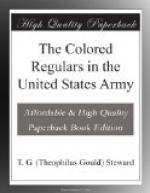I do not know when this “soldier” song had its birth, but it may have sprung out of the perplexity of the slave’s mind as he contemplated the raging conflict and saw himself drawn nearer and nearer to the field of strife. Whether in this song the “present predominates,” and the query, therefore, has a strong primary reference to carnal weapons and to garments dyed in blood; whether the singer invites an opinion as to his fitness to engage in the war for Freedom—it may not be possible to determine. The “year of Jubilee,” coming in the same song in connection with the purpose for which the singer is to be made a soldier, gives clearer illustration of that combination of the present and future which Mr. Higginson says was always present in the spirituals of that period, if it shows no more. When it is remembered that at that time Charleston was literally trodden under foot by black soldiers in bright uniforms, whose coming seemed to the colored people of that city like a dream too good to be true, it is not hard to believe that this song had much of the present in it, and owed its birth to the circumstances of war.
Singularly enough the song makes the Negro ask the exact question which had been asked about him from the earliest days of our history as a nation, a question which in some form confronts him still. The question, as the song has it, is not one of fact, but one of opinion. It is not: Will I make a soldier? but: Do you think I will make a soldier? It is one thing to “make a soldier,” another thing to have men think so. The question of fact was settled a century ago; the question of opinion is still unsettled. The Negro soldier, hero of five hundred battlefields, with medals and honors resting upon his breast, with the endorsement of the highest military authority of the nation, with Port Hudson, El Caney and San Juan behind him, is still expected by too many to stand and await the verdict of thought, from persons who never did “think” he would make a soldier, and who never will think so. As well expect the excited animal of the ring to think in the presence of the red rag of the toreador as to expect them to think on the subject of the Negro soldier. They can curse, and rant, when they see the stalwart Negro in uniform, but it is too much to ask them to think. To them the Negro can be a fiend, a brute, but never a soldier.
To John G. Whittier and to William C. Nell are we indebted for the earliest recital of the heroic deeds of the colored American in the Wars of the Revolution and 1812. Whittier contributed an article on this subject to the “National Era” in 1847, and five or six years later Nell published his pamphlet on “Colored Patriots,” a booklet recently reprinted by the African Methodist Episcopal Church. It is a useful contribution, showing as it does the rising and spreading abroad of that spirit which appreciates military effort and valor; and while recognizing the glory that came to American arms in the period described,




